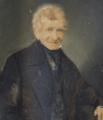Old University of Leuven facts for kids
|
|
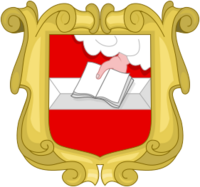
Coat-of-arms of the old University of Louvain
|
|
| Latin: Studium Generale Lovaniense ; Academia Lovaniensis ; Universitas Lovaniensis | |
| Active | 1425–1797 |
|---|---|
| Location | , |
The Old University of Leuven (also called Old University of Louvain) was a famous school in Leuven, a city in what is now Belgium. It was founded in 1425 and was a very important place for learning in Europe.
This university was known as a studium generale, which means a place where all kinds of subjects were taught, much like a university today. It was closed in 1797 after the area became part of France.
The university had different names over time. In Latin, it was often called Universitas Lovaniensis. In Dutch, people called it Universiteyt Loven. People often add "old" to its name to tell it apart from newer universities in Leuven.
Contents
How the University Started
In the 1400s, the leaders of the town of Leuven wanted to have a university. They asked the Pope for permission.
Pope Martin V agreed and officially started the university on December 9, 1425. He issued a special document called a papal bull. This new university was independent from the local church leaders.
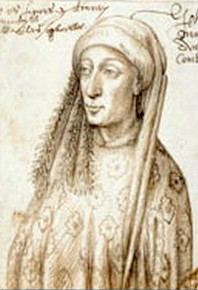
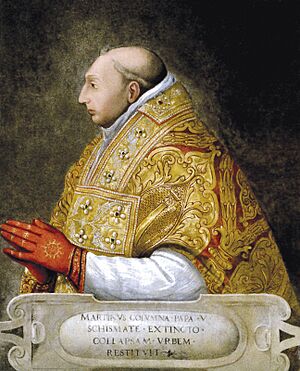
For most of its history, until it closed in 1797, all classes at the university were taught in Latin.
A Place of Learning and Famous Scholars
In its early years, the University of Leuven was similar to other big universities of that time, like those in Paris and Cologne. It became very successful in the 1500s because many famous thinkers and teachers worked there.
Some of these important people included Pope Adrian VI (who later became a Pope!), Desiderius Erasmus, Andreas Vesalius (known as the father of modern anatomy), and Gerardus Mercator (a famous mapmaker).
In 1519, the university's theology department was one of the first to speak out against some of the ideas of Martin Luther. This happened even before the Pope officially condemned Luther's views.
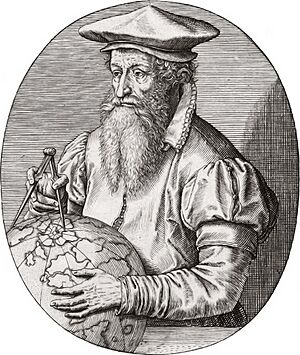
Why the University Closed
After a series of wars, the area where Leuven was located became part of France in 1797. French laws at the time said that all universities in France had to close.
Because of this, the University of Leuven was officially closed on October 25, 1797. Many of its books and other items were moved to a new school in Brussels.
Important Ideas and Influence
For a long time, the University of Leuven was a major center for a religious movement called Jansenism. This was a way of thinking about Christian theology. Many professors at the university, like Cornelius Jansen and Zeger Bernhard van Espen, were strong supporters of these ideas.
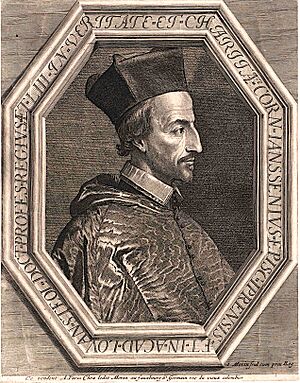
Even when the Pope tried to stop Jansenism, the university remained a place where these ideas were discussed and taught. This shows how influential the university was in shaping religious thought in Europe.
What Happened After
After the Old University of Leuven closed, people tried to create new universities in the area.
- The State University of Leuven existed from 1817 to 1835. Some professors from the old university taught there.
- The Catholic University of Leuven was founded in 1835. It aimed to bring back the Catholic learning traditions of the old university.
In 1968, the Catholic University of Leuven split into two separate universities:
- The Dutch-speaking Katholieke Universiteit Leuven
- The French-speaking Université catholique de Louvain
The University Library
For a long time, the university didn't have a main library. Students likely used books owned by their professors.
In 1636, an official university library was finally opened in a building called the Cloth Hall. It was later made bigger and more beautiful in 1725.
When the university closed in 1797, many of its books were moved to Brussels. The most valuable books and old manuscripts were sent to the National Library in Paris.
It's important to know that when the library of the Catholic University of Leuven was burned during World War I, it did not contain the books or records of the very old university. Those had already been moved or were part of other collections.
University Records
The important historical records of the Old University of Leuven were saved after it closed. They were moved to the National Archives of Belgium.
These archives are so important that UNESCO has recognized them as a world heritage. They contain a lot of information about the university's long history.
Colleges of the University
The university had many smaller colleges where students lived and studied. These were like dorms and study centers combined. In the early 1700s, there were 18 such colleges.
| Foundation Year | Name | Remarks | |
|---|---|---|---|
| 1. | 1431 | Grand College de Burcht | founded by Godfrey de Goimpel |
| 2. | 1430 | Grand College het Varken | foundation by Henri de Loë |
| 3. | 1493 | Grand College de Lelie | foundation by Charles Viruli |
| 4. | 1546 | Grand College de Valk | foundation by Guillaume Everaerts |
| 5. | 1442 | Grand College of Theology | Foundation by Louis de Rycke |
| 6. | 1662 | Minor College of Theology | |
| 7. | 1483 | College of Saint-Yvo | Foundation by Robert van den Poele |
| 8. | 1484 | College of Saint-Donatian | Foundation by Antoine Haveren |
| 9. | 1499 | Houterlé-College | Foundation by Henry of Houterlé |
| 10. | 1504 | Winckele-College | Foundation by Jean de Winckele |
| 11. | 1509 | Arras-College | Foundation by Nicolas Ruistere |
| 12. | 1490 | Standonck-College | Foundation by Jean Standonck |
| 13. | Three Tongues-College | Foundation by Jerome of Buyslede | |
| 14. | 1523 | Pontifical College | Foundation by Adrian VI |
| 15. | 1535 | Saint-Anne's College | Foundation by Nicolas Goublet |
| 16. | 1551 | Savoye's College | Foundation by Eustache Chapuis |
| 17. | 1559 | Druite College | Foundation by Michel Druite |
| 18. | 1569 | van Daele's College | Foundation by Peter van Daele |
| 19. | 1569 | Viglius' College | Foundation by Viglius ab Aytta Zuichemus |
| 20. | 1574 | Craendonck College | Foundation by Marcel Craendock |
Notable People from the University
Many important people were connected to the Old University of Leuven, either as students or as professors.
Famous Professors
- Michael Baius (1513–1589): A theologian who inspired the Baianism movement.
- Grégoire de Saint-Vincent (1584-1667): A mathematician.
- Cornelius Jansen (1585-1638): A key figure in Jansenism.
- Zeger Bernhard van Espen (1646-1728): A legal expert and theologian.
- Jean-Pierre Minckelers (1748-1824): Known for inventing lighting gas.
- Charles Lambrechts (1753-1825): A professor and later a government minister in France.
Famous Alumni (Students)
- Adriaan Floriszoon Boeyens (1459–1523): He later became Pope Adrian VI.
- Desiderius Erasmus (1466–1536): A very important humanist scholar.
- Gerard Mercator (1512–1594): A famous mapmaker.
- Andreas Vesalius (1514–1564): Considered the founder of modern anatomy.
- John Dee (1527–1608 or 9): A mathematician, astronomer, and advisor to Queen Elizabeth I.
- Justus Lipsius (1547–1606): A famous scholar of classical texts.
- Cornelius Otto Jansen (1585–1638): The person who started the Jansenism movement.
Images for kids
-
Charles Lambrechts (1753–1825), professor of canon law (1777), rector of the University of Louvain in 1786 and freemason member of the lodge "the true and perfect Harmony" in Mons and Minister of Justice of the French Republic from 3 Vendémiaire year VI to 2 Thermidor year VII (24 September 1797 – 20 July 1799).
See Also
- Academic libraries in Leuven
- Catholic University of Leuven
- Collegium Trilingue
- Katholieke Universiteit Leuven
- List of medieval universities
- State University of Leuven
- Université catholique de Louvain
 | Claudette Colvin |
 | Myrlie Evers-Williams |
 | Alberta Odell Jones |




